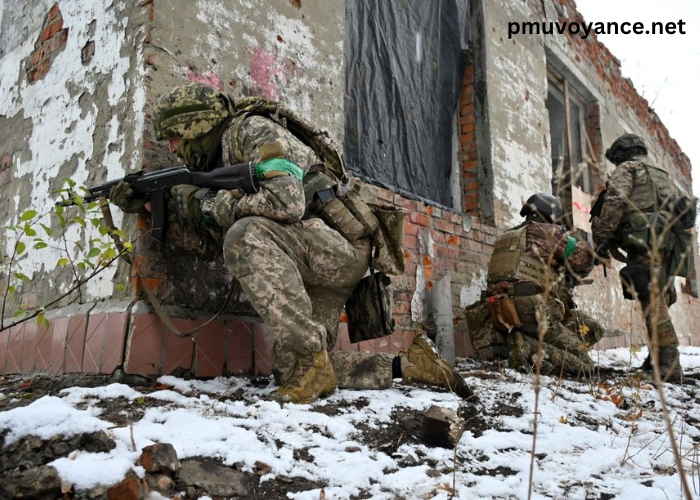The Guerre en Ukraine, or war in Ukraine, has been one of the most significant geopolitical crises in recent history. Beginning in 2014 with the annexation of Crimea by Russia, the conflict escalated in 2022 with a large-scale invasion of Ukraine by Russian forces. This war has drawn in global powers, with far-reaching consequences not only for the countries directly involved but also for international relations, economics, and global security. The Guerre en Ukraine has caused immense human suffering, leading to loss of life, displacement, and profound political instability.
As the conflict continues, the world has watched with concern as Ukraine fights to preserve its sovereignty against a much larger military power. While diplomatic efforts have been made to broker peace, the ongoing hostilities demonstrate the complex nature of modern warfare. The Guerre en Ukraine has fundamentally altered global alliances, triggering sanctions, and leading to an influx of support for Ukraine from Western nations. The economic and military aid provided to Ukraine highlights the strategic importance of this conflict, with global powers like the United States, the European Union, and NATO involved in various capacities.
What Are the Main Causes of the Guerre en Ukraine?
The Guerre en Ukraine can be traced back to a series of historical, political, and cultural tensions that have existed between Russia and Ukraine for centuries. One of the primary causes of the conflict is Russia’s desire to maintain influence over former Soviet territories, including Ukraine. Russia sees Ukraine as part of its sphere of influence and has long been wary of Ukraine’s growing ties with Western organizations like the European Union (EU) and NATO. This geopolitical struggle over Ukraine’s alignment—whether to the East with Russia or the West with NATO—has been a significant source of tension.
Another contributing factor is the complex historical relationship between Ukraine and Russia. Ukraine’s struggle for independence and its desire for closer ties to the West have often been viewed by Russia as a threat to its dominance in the region. The Guerre en Ukraine can also be seen as a continuation of Russia’s broader policy of maintaining control over its neighboring states and preventing them from embracing democratic reforms that could inspire movements within Russia itself. These long-standing issues, combined with specific incidents like the annexation of Crimea, laid the groundwork for the ongoing conflict.
How Has the Guerre en Ukraine Affected Global Geopolitics?
The Guerre en Ukraine has had a profound impact on global geopolitics, reshaping alliances and prompting a reevaluation of international security frameworks. The invasion of Ukraine by Russia in 2022 led to widespread condemnation from the West, which resulted in significant sanctions against Russia. The war has also brought NATO back into the spotlight, with NATO members providing military and financial support to Ukraine in an effort to counterbalance Russia’s aggression.
In addition to NATO’s involvement, the Guerre en Ukraine has also led to stronger partnerships between the United States and European nations. The European Union, in particular, has been deeply engaged in providing both humanitarian aid and military support to Ukraine, while also imposing stringent sanctions on Russia. The conflict has demonstrated the vulnerability of European security, prompting discussions about energy independence, defense spending, and the future role of the EU in global politics. Meanwhile, Russia’s increasing isolation from the international community has led it to strengthen ties with other countries, including China, which has become an important ally in the face of global sanctions.
What Is the Humanitarian Impact of the Guerre en Ukraine?
The Guerre en Ukraine has caused a severe humanitarian crisis, with millions of people affected by violence, displacement, and economic hardship. Over 13 million Ukrainians have been forced to leave their homes, with many fleeing to neighboring countries such as Poland, Slovakia, and Romania. The refugee crisis has overwhelmed the resources of host countries and created significant challenges for international organizations trying to provide support.
The war has also led to the destruction of critical infrastructure in Ukraine, including hospitals, schools, and homes, exacerbating the suffering of civilians. Many Ukrainians have lost their lives, while others have been injured or traumatized by the violence. The international community has mobilized to provide humanitarian aid, but the sheer scale of the crisis has made it difficult to meet the needs of all those affected. The Guerre en Ukraine has highlighted the importance of international cooperation in addressing humanitarian emergencies, with organizations like the United Nations and the International Red Cross working to provide essential services in war-torn regions.
How Has the Guerre en Ukraine Affected the Global Economy?
The Guerre en Ukraine has had a significant impact on the global economy, particularly in terms of energy prices, trade disruptions, and inflation. Ukraine and Russia are major producers of wheat, oil, and gas, and the war has caused massive disruptions to global supply chains. The invasion of Ukraine has led to a sharp increase in the price of energy, with Europe particularly affected due to its reliance on Russian natural gas. The West has responded to Russia’s actions by imposing economic sanctions, which have further strained global trade.
The war has also had a profound impact on inflation rates, with food and energy prices soaring globally. Countries in the developing world have been particularly vulnerable to these price hikes, as they rely on imports of wheat and other essential goods from Ukraine and Russia. The Guerre en Ukraine has also accelerated the shift towards renewable energy sources as nations look for alternatives to Russian oil and gas. In the longer term, the conflict may lead to a reshaping of global trade networks and an increased focus on energy security and self-sufficiency.
What Are the Prospects for Peace in the Guerre en Ukraine?
As of now, the prospects for peace in the Guerre en Ukraine remain uncertain. Despite numerous diplomatic efforts, including talks mediated by Turkey and other nations, a comprehensive peace agreement has not yet been reached. The ongoing military offensives by both sides have made it difficult for meaningful negotiations to take place. Ukraine has made it clear that it will not negotiate its territorial integrity, particularly with respect to Crimea and the Donbas region, which are currently under Russian control.
On the other hand, Russia has insisted on certain security guarantees and the recognition of Crimea as part of Russian territory. The stark differences in the goals of the two sides have made it challenging to reach a mutually acceptable resolution. However, international pressure, the economic toll of the war, and the potential for military exhaustion could eventually push both sides to the negotiating table. In the meantime, the humanitarian crisis continues to worsen, and the world waits to see whether peace can be achieved in the near future.
Conclusion
In conclusion, the Guerre en Ukraine has become one of the most significant and devastating conflicts of the 21st century, with profound implications for global politics, economics, and humanitarian conditions. While the war has reshaped international alliances, it has also highlighted the fragility of security in Europe and the world.
The ongoing humanitarian crisis continues to demand urgent attention from the global community. Ultimately, the future of Ukraine and its sovereignty hangs in the balance, with the hope for peace appearing distant yet essential for the stability of the region and the world. The Guerre en Ukraine will remain a key issue in international relations, and its resolution will have far-reaching consequences for generations to come.



